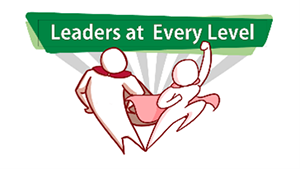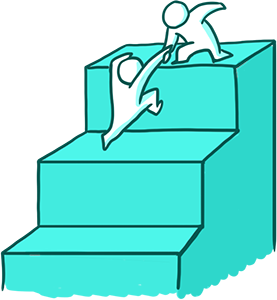How to Develop Leaders at Every Level
 When you develop leaders at every level, you strengthen the organization and will significantly boost employee engagement. Now that we’ve established the difference between leadership and management, explained the importance of leadership at every level, and described the specific skills to focus on first, it’s time to look at practical and implementable ways to develop leaders at every level.
When you develop leaders at every level, you strengthen the organization and will significantly boost employee engagement. Now that we’ve established the difference between leadership and management, explained the importance of leadership at every level, and described the specific skills to focus on first, it’s time to look at practical and implementable ways to develop leaders at every level.
 As this CONNECT2Lead Series continues, we’ll also examine the impact you’ll have on retention, what it looks like to lead when you don’t have a management title, the importance of self-leadership, and the culture you’ll create when you have leaders at every level.
As this CONNECT2Lead Series continues, we’ll also examine the impact you’ll have on retention, what it looks like to lead when you don’t have a management title, the importance of self-leadership, and the culture you’ll create when you have leaders at every level.
In this article, we want to give you easy, effective and proven resources for developing your leaders at every level. First things first, let’s give you credit for what you’ve already accomplished and a reminder (one you wish weren’t true!).
Yes, It Does Need to Be Deliberate and Planned!
The illusion of development is your biggest enemy. You go through annual talent reviews, use a 9-box model to assess performance and potential, and rely on the “cream” to rise to the top. Then, suddenly, you’ve got an open position to fill… And all that internal “cream” seems curdled. What happened?
You left too much up to chance.
Sure, people who are motivated and talented will develop naturally. They’ll be curious, and they may pursue stretch assignments or mentoring that builds skills. Until they don’t. What stops them? It could be any combination of:
- They’re busy and focused on the daily deliverables in their current role.
- They’re burned out thanks to short staffing, heavy workloads or other common culprits.
- They’re feeling unrecognized and unrewarded for the development they’ve already done.
- They’re tired of trying when there’s no clear path or support for development.
- They’re confused about what skills they should work on.
- They’re disappointed by a lack of leadership elsewhere in the organization.
- They’re not seeing the value of doing the extra work because it feels like “who you know” is more important than “what you know.”
- They’re convinced that technical/functional skills matter more.
- They’re distracted by workplace drama or negativity.
- They’re already the “frontrunner” or “heir apparent” so they don’t see a need to keep learning or stretching.
On top of all the reasons people may not continually push themselves, there’s also the “halo effect” to content with. Most talent review processes are rife with this. Managers and others overlook flaws and gaps in the employees who are in the “high performance/high potential” box. By labeling people this way, it could suggest that they don’t need to do any additional work on self-improvement.
Sometimes, there’s a suppression of development because mangers wait for HR to launch formal programs rather than finding day-to-day development opportunities. At the same time, HR believes that those high per / high po folks are getting what they need because they’ve been identified. The void isn’t addressed, and the development isn’t happening.
Planned, deliberate development is the only remedy.
You Already Know, Partly, How to Develop Leaders at Every Level
Don’t discount what you’re already doing right. It’s the best place to start and build. Approach your next steps as additive rather than scrapping all the work that’s already been done.
Before you leap to the conclusion that you’re not doing anything to develop leaders at every level, consider what’s offered in:
- Onboarding, especially the part where you describe your culture, company values, and mission/vision. You’ve probably got some elements there related to inspiring others.
- Functional training programs (like sales, management, customer service). Within these functions, there’s a chance you’ve already got training on some soft, transferable skills.
- Leadership development for executives, whether it’s internal or external. What are they already sharing with others?
- Informal ways by managers or employees who have taken the initiative to share leadership learnings.
- Your LMS. Oftentimes, there’s a goldmine of untapped, pre-loaded content just waiting for someone to discover and promote it.
This additive approach is exactly the same one you’ll use as you develop leaders at every level. Each individual is starting with some raw ingredients that can be amplified and extracted in new ways. Discovering what’s already there and recognizing provides encouragement and familiarity that will make anything you add more palatable.
If you already coach, mentor or personally teach executives or managers how to be more effective, then you’ve got the base of your blueprint already. Your next step is to layer in more learning and to expand it throughout the organization in a deliberate, planful way.
Some New Ways to Implement Leadership Development for All
You don’t have to start from scratch to build your own internal programs. There’s no need for guesswork and risk in sourcing quality programs. Give us a try with these proven, popular programs and offerings.
People First Leadership Academy is a product of People First Productivity Solutions. It’s where you’ll find 40+ free and affordable courses for leadership development and personal effectiveness. Some are listed below, but you’ll want to check out the full course catalog to find the right fit for your leaders at every level.
The Leadership Practices Inventory® (LPI®) is an assessment tool available as a 360 or as a self-assessment. It reveals the 30 key behaviors of effective leaders and gives participants an opportunity to see which are already strong and which may need additional attention.
Self Empowered™ is a 4-hour course, self-assessment, and coaching experience designed specifically for leaders at every level. Public workshops are available six times a year on People First Leadership Academy, and this course is also offered privately within organizations or teams.
The Leadership Challenge® is a transformative experience with workshops, 1:1 coaching, and the 360 version of The Leadership Practices Inventory. Over six million leaders have participated in this program.
Emotional Intelligence Coaching: The EISA self-assessment and coaching session in this package provide immediate insights into areas that can enhance interpersonal relationships.
Critical Thinking Video Playlist: Over 40 video shorts are available on this YouTube playlist called No More Lazy Thinking. Build your mental might with these key concepts for critical thinking.
Clifton StrengthsFinder is the well-known instrument for discovering and unleashing your workplace strengths. Our offering includes a 1:1 session for understanding and action planning.
ECHO Listening Assessment is an assessment and debrief coaching session to help you identify your listening habits and discover instant fixes for communicating better.
TKI Conflict Instrument Mode is for anyone who wants to get more comfortable when handling conflict by understanding the five primary styles of conflict and how to navigate each one.
The Essentials of Personal Effectiveness is a free, self-paced course with snack-size lessons delivered weekly for 13 consecutive weeks.
That’s a lot of options! If you’re not sure where to start, take a closer look at Self Empowered™, a course designed specifically for leaders at every level.

